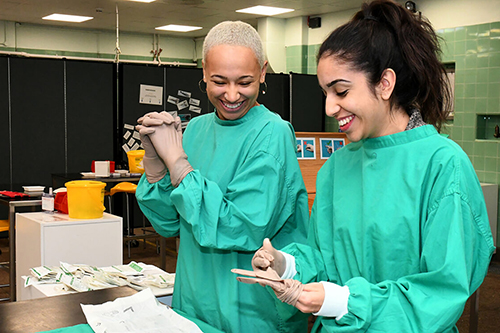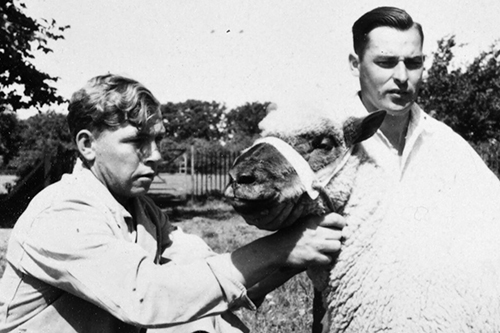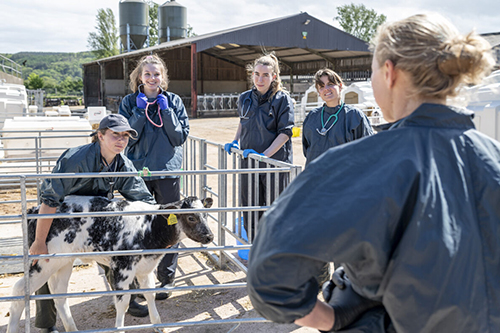In 1944 the Government of the day set up a committee under the chairmanship of Thomas Loveday, then Vice-Chancellor of Bristol, to consider the future of veterinary education. The Loveday Committee recommended in 1946 that veterinary education should be expanded and that veterinary schools should be incorporated into the university system. Two new veterinary schools were to be founded, making six in all, one of which was to be at Bristol with 30 graduates a year.
The University purchased the Langford Estates, 14 miles south west of Bristol, to be used as a field station. In May 1948 it was announced that the first group of veterinary students would be admitted in October 1949.
More than 5,000 veterinary graduates later, Bristol Veterinary School currently has over 1,300 students across Veterinary Science, Veterinary Nursing and postgraduate programmes and close to 200 staff, and has evolved through its developments in education, practical skills, scientific understanding and its ‘One Health’ approach.
Tim Parkin, Head of Bristol Veterinary School and Professor of Veterinary Epidemiology, said: “We are proud to celebrate our 75th anniversary. Not only are we about to graduate our 70th cohort of veterinary surgeons, but 2024 also marks the 25th anniversary of the launch of our veterinary nursing programmes. Bristol Veterinary School remains a dynamic force, preparing veterinary surgeons and veterinary nurses for the challenges ahead.”
Professor Jeremy Tavaré, Pro Vice-Chancellor and Executive Dean for the Faculty of Health and Life Sciences, added: “I’m delighted to be celebrating Bristol Veterinary School’s 75 years. Its excellence in teaching and research has resulted in greater understanding and some real-world changes benefiting the health and welfare of both animals and humans, which is testament to the School’s remarkable staff, students and graduates.”
Here, we shine the spotlight on some of Bristol Veterinary School’s milestones over the course of its history.
1. Gorilla regains full sight in cataract operation
Romina, a Western lowland gorilla at Bristol Zoo Gardens who underwent the first ever cataract operation performed in Europe on an adult gorilla in April 2002, had her sight fully restored to both eyes at the Bristol Veterinary School by a pioneering Bristol veterinary and medical team.
2. Queen Camilla visits the University's School of Veterinary Sciences
Her Majesty, Queen Camilla, became Patron of the Langford Trust for Animal Health and Welfare in 2006. The Trust is a charity that supports the Veterinary School in funding clinical research and equipment. In 2007, in her capacity as Patron, Queen Camilla visited the School for a tour of the facilities, and again in 2012 to open two new state-of-the-art facilities. Her Majesty is still patron of the Langford Trust.
3. Generation Pup and Bristol Cats
Generation Pup, led by the Bristol Veterinary School and the Dogs Trust, is a cohort study that follows the health, welfare and behaviour of individual dogs over their lifetime. The study is already enabling researchers to investigate whether events or environments early in life influence the development of conditions as dogs get older.
Bristol Cats, a longitudinal study launched in May 2010, follows the lives of around 2,200 registered cats. Its aim is to improve knowledge of common feline diseases and behaviour disorders, such as overgrooming, aggressive behaviour, obesity and diabetes. Findings from the study may be used by veterinary practitioners, cat breeders, owners and the cat community to improve the health and welfare of cats in the future.
4. Preventing tick-borne disease
The largest study of dog ticks ever undertaken in the UK provided the science behind a successful and high-profile ‘The Big Tick Study’ campaign which raised awareness of tick-borne diseases and how to protect against them. Prior to the campaign, 47% of pet owners asked were unaware that people are also at risk of infection from tick-borne diseases. Thanks to the interdisciplinary research team, led by Bristol’s Biological Sciences and Veterinary School and the campaign it informed, a later survey found 71% of the veterinary surgeons involved reporting a higher client awareness of the risks presented by ticks.
5. Bristol Veterinary School leading the way to change antimicrobial use on farms
Antimicrobial resistance - or AMR - is a global threat, with an estimated 700,000 people dying from resistant infections every year. Bristol AMR researchers are leading the way to inspire and change antimicrobial use and working closely with farmers, animal owners, veterinary surgeons, food retailers and government bodies to encourage responsible use of antimicrobials.
7. £1 million donation to establish a 'living laboratory' for livestock
The world faces a huge problem of feeding an ever-expanding population with depleting agricultural resources. Research ongoing at the John Oldacre Centre for Sustainability and Welfare in Dairy Production, based within Wyndhurst Farm, is actively tackling the global challenge of ethical food security and train the next generation of veterinary surgeons and agriculturalists to help address the major issues facing agriculture.
8. Using artificial intelligence to help prevent disease
Diseases in dairy cows compromise health and welfare, and lead to financial losses for farmers and the industry. Ill cows have also been found to contribute more to methane emissions, impacting the environmental sustainability of the sector. Researchers at Bristol Veterinary School are currently using artificial intelligence to identify ways it can be used to detect developing mastitis or lameness – two of the most significant diseases affecting dairy cows and the UK dairy industry.
9. Kordofan giraffes face local extinction if poaching continues
The MSc Global Wildlife Health and Conservation, taught in collaboration with Bristol Zoological Society, is a unique Veterinary School postgraduate programme. A study performed by students and staff last year highlighted that the poaching of two critically endangered Kordofan giraffes per year could, in just 15 years without intervention, result in extinction within Cameroon's Bénoué National Park.


